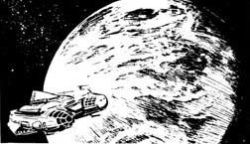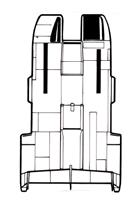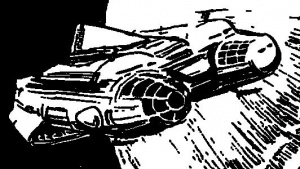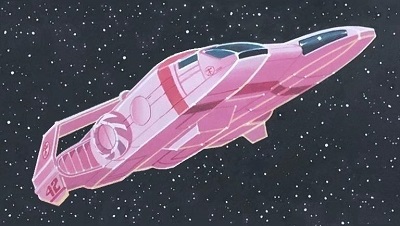Type A2 class Far Trader
| Type A2 class Far Trader | |
|---|---|
 | |
| Type: A Trader | |
| Category | ACS |
| Size | 200 Tons |
| Hull Configuration | Wedge Hull |
| Streamlining | Streamlined Hull |
| Tech Level | TL–13 |
| Engineering | |
| Computer | Model 1/bis |
| Jump | J-2 |
| Maneuver | 1 G |
| Fuel Treatment | Scoops, Purifier |
| Armaments | |
| Hardpoints | 2 |
| Accommodations | |
| Staterooms | 10 |
| Low Berths | 4 |
| Personnel | |
| Crew | 4 |
| High/Mid Passengers | 7 |
| Low Passengers | 4 |
| Payload | |
| Cargo | 61 Tons |
| Fuel tank | 50 Tons |
| Carried craft | 1 4T air/raft |
| Construction | |
| Construction Time | 8 Months |
| Origin | Third Imperium |
| Manufacturer | Ling-Standard Products |
| Price | |
| Cost | MCr66.175 |
| Statistics | |
| Quick Ship Profile | A-BS12 |
| Universal Ship Profile | A-21211R1-000000-00000-0 |
| Images | |
| Blueprint | Yes |
| Illustration | Yes |
| Source | |
| Canon | Published, canon design |
| Designer | Marc Miller |
| Design System | High Guard |
| Era | 1105 |
| Reference | Traders and Gunboats 23-27. |
The Type A2 class Far Trader is a further development of the venerable Type A.
Description (Specifications)[edit]
Using a 200-ton TL–10 streamlined hull, it has drives capable of Jump-2 and 1-G acceleration. Fuel tankage of 50 tons supports Jump-2 and two months of operation, and the ship incorporates fuel scoops and fuel intakes for wilderness refueling. The bridge is standard and has a Model/1 bis computer and a basic sensor suite. There are two hardpoints, but no weapons are mounted. Like the free trader, the far trader is built around its cargo bay, in this case 78 tons. The ship has ten staterooms (three for the crew; seven for the passengers) and four low berths. A single air/raft is carried for various ship duties. The ship is streamlined, and can land on uneven terrain. [1][2]
Crew Dossier: The far trader requires a crew of four: pilot/astrogator, two engineers, and steward. [1]
Image Repository[edit]
- Top view of advanced late model A2, a Jayhawk.

- Early model A2, a Garu, after having performed wilderness refueling.

- A very merchant prince-customized Jayhawk class Far Trader.

General Description & Deck Plans[edit]
No information yet available.
Basic Ship Characteristics[edit]
Following the Imperial Navy and IISS Universal Ship Profile and data, additional information is presented in the format shown here. The small craft factor indicates the number of squadrons (...of ten subcraft) carried on the ship. Tonnage on the universal ship profile is shown in kilotons (...thousands of tons) where necessary. [3]
| Basic Ship Characteristics [3] | ||
|---|---|---|
| No. | Category | Remarks |
| 1. | Tonnage / Hull | 200 tons.
|
| 2. | Crew | Crew: Three. Pilot/navigator, engineer, and steward/medic. In addition, two gunners may be carried as needed. [4] |
| 3. | Performance | Propulsion:
Acceleration: 1-G. Normal operations and cruising at 1-G. [4]
|
| 4. | Electronics | x1 Model/1 bis ship computer.
|
| 5. | Hardpoints | x2 hardpoints. |
| 6. | Armament | Armament: Port and starboard hardpoints, each with a dual laser turret standard. Optional weaponry available. [4] |
| 7. | Defenses | No Defensive equipment is normally instealed except for evasion software. |
| 8. | Craft | Ship's Boats: No auxiliary vessels. One four-passenger air/raft carried over the forward cargo loading ramp with interior boarding and access. Used for errands and has limited sub orbital capability. [4] |
| 9. | Fuel Treatment | The ship incorporates fuel scoops for gas giant skimming. |
| 10. | Cost | MCr 66.175. |
| 11. | Construction Time | 8 months. |
| 12. | Comments | Other Equipment:
|
Ship Interior Details[edit]
Interior Details: The far trader is constructed on a two level system. Cargo, bridge, and some drives are on the lower level; passengers, fuel, and power plant are on the upper level. [2]
The bridge occupies the forward starboard section of the lower deck. Its two control positions are surrounded by transparent screens allowing a view of forward and above. Note that the lower level extends farther forward than the upper level. Behind the bridge proper is the computer room (2) and a spare stateroom. When fewer than seven passengers are carried, this stateroom is used for the crew on duty; otherwise, it holds a single passenger. A common area (5) is used for passenger reception, after which they use the lift shaft to the upper passenger deck. In flight, the common area is a crew lounge. [2]
The forward port section of the lower deck is crew quarters. The spacious captain's cabin (22) has transparent screens along one wall and above as a skylight. Bordering the three cabins is the life support equipment and atmosphere recyclers. Between the crew quarters and the bridge is the forward cargo loading ramp. Although this ramp and door is not equipped with an air lock, it does allow a straight vehicle approach for cargo loading on hospitable worlds. [2]
The upper level forward is the passenger deck. Six passenger staterooms line the outer bulkheads while a large central area (26) provides recreational facilities and galley. The grav plate floor fields for individual staterooms and for sections of common area may be adjusted from 0.1 to 2.0 G, depending on the preferences of individual passengers. Centered above the cargo loading ramp is the ship's air/raft, with easy access and launch from inside the ship. [2]
The center of the ship is occupied by the 61.0 ton cargo bay. Reinforced deck planking and strategically placed tie-downs make the bay capable of handling modular cargo containers, palletized shipments, or individually packaged items and bulky mechanisms. Above the cargo bay is the ship's 50.0 ton fuel tankage. [5]
To both port and starboard on the lower level, corridors run the length of the ship, connecting the forward control areas with the aft drive rooms. Each corridor provides access to the ship's turrets, to a cargo air lock, and to the fuel scoop and purification mechanisms. The port corridor provides access to the ship's four low berths. These low berths were originally intended for carrying livestock in the 100 to 400 kilogram range. For this reason, the berths are close to the port cargo lock, and the entire area can be sealed off with hatches and doors in the event that an animal gets loose. The starboard corridor provides access to the ship's locker, which contains the ship's armory, survival equipment, cold weather clothing, and other essential materials. [6]
Aft, the drive rooms contain the ship's jump and maneuver drives, with the power plant mounted transversely on the upper deck. [6]
Ship Weaponry & Defenses[edit]
Weaponry: The ship's two weapons turrets provide tremendous potential for armament in the event that the ship should require it. The standard weapon mix for the ship is two dual laser turrets. Gaining favor, however, among free traders is a homogeneous mix consisting of one laser, one missile rack, and one sandcaster in each turret. The result is a set of weapons that can respond to many different threats and penetrate the defenses of several different types of targets. [6]
Ship Subcraft[edit]
The Air/Raft: The ship's air/raft is a standard vehicle intended to provide the means to run small errands on planet while the ship is in port loading and unloading cargo. Massing four tons, the air/raft is an anti-gravity vehicle capable of lifting four tons, including passengers and cargo. It can achieve 100 kph as a cruise speed, with occasional bursts to 150 kph. In extreme situations, the craft can achieve sub-orbital flight, but this performance requires approximately six hours. All passengers would be required to wear vacc suits, as the air/raft is open and not pressurized. [6]
The air/raft operates off capacitors charged from the ship's main power plant. One charge is sufficient for about one week or about 10,000 kilometers of cruising. Recharges take about two hours; since they use energy from the ship they are essentially free. [6]
Ship Cost & Revenues[edit]
Costs and Revenues: The monthly payments for a ship of this type amount to Cr275,729. Further expenses for crew salaries, life support, maintenance, and berthing fees amount to Cr60,714 per month, assuming a jump every two weeks. Fuel is free for the skimming, but would add another Cr5000 per jump when its purchase is required. This type of merchant can gross approximately Cr242,000 per month, assuming a full manifest of middle and low passengers and a full cargo bay at Cr1000 per ton of cargo. Obviously, even with a full load, this ship would be unable to make its payments; it could conceivably come close to breaking even if the crew went on shares and salaries were foregone. [6]
Instead, the owner would be required to engage in trade and speculation in order to make up the difference between what the ship normally earns and what must be paid every month. Charters might also seem an attractive alternative. [7]
History & Background (Dossier)[edit]
The far trader ranges far and wide, and deals with every world it finds. Even amber zones and red zones are not considered off limits by its captains, provided there is profit to be made and the risk of being caught is slight. [1]
THE FAR TRADER: The basic ship involved in free trade is called the free trader. Variations on the basic ship have resulted in variations in the name. The subsidized merchant, partly because of its size, and partly because of its subsidy, is called the fat trader. Some well-equipped high-G traders employed beyond the Imperial border are called fast traders. The type A2 far trader derives its name from its jump capability: its drives are capable of Jump-2, twice what the standard free trader can do. The far trader can be encountered anywhere in the Imperium. It ranges far and wide, and deals with every world it finds. Even amber zones and red zones are not considered off limits by its captains, provided there is profit to be made and the risk of being caught is slight. [2]
Class Naming Practice/s & Peculiarities[edit]
The design of the far trader has ship security in mind, and so all passengers are segregated onto a passenger deck. Their access to the bridge and to other areas of the ship is limited. Unfortunately, when a seventh passenger is carried, he or she is berthed adjacent to the bridge. Original specifications did not envision more than six passengers, but the profit motive has led to them being overridden. [6]
Class Naming Practice/s: No information yet available.
Selected Type A Variant Ships[edit]
In addition to minor variations based on the ship's weaponry, one major variant has been produced — a cheaper A1 free trader with large cargo capacity. The A1 free trader is essentially identical in performance with the type A but is otherwise similar to the A2. It has only four low passage berths, a computer Model/1, and Jump-1, 1-G capabilities. Its cargo capacity is increased to 81 tons, primarily through a higher ceiling on the cargo bay; its fuel capacity is reduced to 30 tons, and much of the drive room becomes waste space. Cost is MCr54.5, which still cannot compete with the type A, primarily because it uses a cheaper hull configuration. Nonetheless, some of these ships can be encountered; they are externally identical to the type A2.[7]
Selected Variant Types & Classes[edit]
18 Representative Far Trader (A) Classes[edit]
References[edit]
| This article has metadata. |

|
This ship was originally designed using one of the Classic Traveller ship design rules:
|
This ship was originally designed using MegaTraveller ship design rules.
|
This ship was originally designed using Mongoose Traveller (1st Edition) ship design rules.
|
- Marc Miller. Traders and Gunboats (Game Designers Workshop, 1980), 23-27.
- Marc Miller. Imperial Encyclopedia (Game Designers Workshop, 1987), 81.
- Thom Gressman, J. Andrew Keith, Joe Fugate, Nancy Parker, Bill Hezeltine. The Flaming Eye (Digest Group Publications, 1990), IFC,IBC.
- Marc Miller. T5 Core Rules (Far Future Enterprises, 2013), 358.
- Martin Dougherty. Type-A Free Trader (Mongoose Publishing, 2015), 1-12.
- James Miller. Type A Far Trader (Scrying Eye Games, 2012), .
- Cynthia C. Higginbotham. Republic of New Home Fan Site
- ↑ 1.0 1.1 1.2 Marc Miller. "Starship Design and Construction." T5 Core Rules (2013): 358.
- ↑ 2.0 2.1 2.2 2.3 2.4 2.5 Marc Miller. Traders and Gunboats (Game Designers Workshop, 1980), 23.
- ↑ 3.0 3.1 Timothy B. Brown. Fighting Ships (Game Designers Workshop, 1981), 10.
- ↑ 4.00 4.01 4.02 4.03 4.04 4.05 4.06 4.07 4.08 4.09 4.10 Marc Miller. Traders and Gunboats (Game Designers Workshop, 1980), 24.
- ↑ Marc Miller. Traders and Gunboats (Game Designers Workshop, 1980), 23-26.
- ↑ 6.0 6.1 6.2 6.3 6.4 6.5 6.6 Marc Miller. Traders and Gunboats (Game Designers Workshop, 1980), 26.
- ↑ 7.0 7.1 Marc Miller. Traders and Gunboats (Game Designers Workshop, 1980), 27.